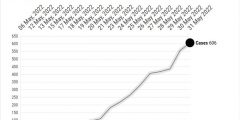Science, communication, politics and power
September 2, 2022
I haven’t written about science communication for a while. It’s a thorny subject. But a few days ago, Ken Rice posted some musings on science communication which made me think. He argues that when ‘we’ (I suppose he means individuals or nations or indeed policy makers) don’t “deal with various societal problems as well as …
Poxpics: The visual discourse of monkeypox
August 14, 2022
Last week I talked about the coronavirus as an invisible killer and discussed some shortcomings of that metaphor. However, despite the nefarious uses of that metaphor, we should not forget that the coronavirus IS indeed an invisible threat and can be an invisible killer; no way around it. It wafts through the air unseen and …
Monkeypox
June 3, 2022
I recently saw these stats (as of May 31, 2022, there are 606 cases of Monkeypox worldwide, with the UK having 190, Spain 136, and Portugal 100) and this graph (see featured image). And I thought: Should I write something about monkeypox? Then I thought: Why not, just to get things straight in my head. …
Lockdown, freedom and responsibility
February 23, 2022
Two years ago, we learned a new word: ‘lockdown’. This was in fact an old word which acquired a new meaning during the Covid-19 pandemic. That new meaning gradually changed over time. Now ‘lockdown’ has more or less lost its meaning and just stands for something to be avoided at all cost or something that …
Superimmunity
February 11, 2022
From the start of the pandemic in the distant spring of 2020 linguists and communication researchers have kept an eye on language. They observed the emergence of new words, such as ‘covid’ and ‘covidiots’ and the increase in use and understanding of older or jargon words, such as pandemic, coronavirus, lockdown, social distancing, bubbles, and …










